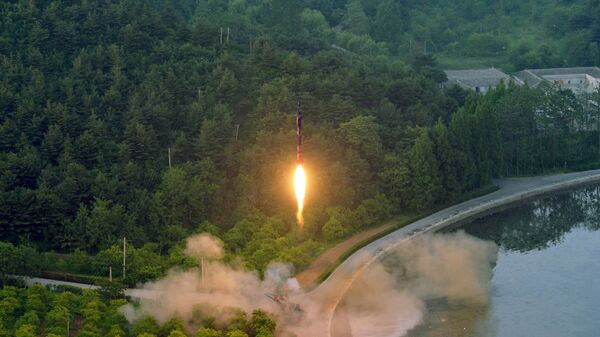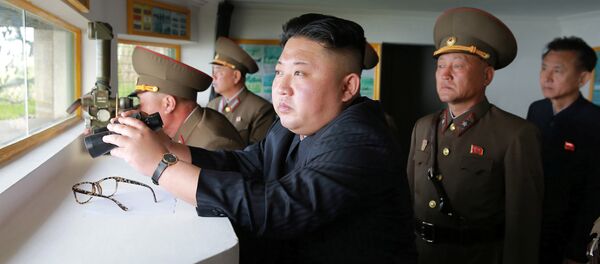The Secretary of the National Security Council of Japan, Shotaro Yachi, told China’s State Councilor, Yang Jiechi, that Japan seeks to enlist the support of China in countering the missile launches of the DPRK, according to the Hong Kong newspaper South China Morning Post.
The request was made during the Sino-Japanese talks held in Tokyo.
"Japan and China need to work together to strongly urge North Korea to avoid further provocative actions and obey things like United Nations resolutions," Yachi was quoted as telling Yang, urging China to take on a bigger role.
Moreover, it became known that the North Korean military tested a new high-precision missile guidance system with the personal participation of the leader of the DPRK Kim Jong-un.
All these factors are making Japan extremely anxious and forcing Japan to seek help from its regional neighbors including China.
Sputnik spoke with Russian experts about whether China will agree to help Japan in this.
An expert of the Institute of the Far East, Valery Kistanov, noted that Japan is quite certain that if a conflict with the DPRK breaks out it is Japan that will suffer the consequences and not the US. This fear is developing into nationwide hysteria, especially in the regions overlooking the Sea of Japan.
“They are seriously preparing for the North Korean attacks on the nuclear power plant and for the arrival of the North Korean troops, Valery Kistanov told Sputnik.
Moreover, it is becoming clear to Tokyo that the sanctions against the DPRK do not give the desired effect. It only strengthens the provocative actions of the DPRK.
Therefore, as Valery Kistanov noted, the Japanese insist “China goes till the end” and “strengthens the pressure.” But the question remains: How will China react to this pressure?
“China is unlikely to do this [increase pressure], because it will mean the collapse of the North Korean regime, its economic strangulation and China is not interested in that because further scenarios after the collapse of the regime are completely catastrophic,” Kistanov said.
He further said that even if it is a regime change by peaceful means China is afraid of three things. “What will happen to nuclear weapons in North Korea? The second problem is the massive inflow of North Korean refugees, including those to China. Thirdly, if the regime collapses and movement towards unification under the auspices of South Korea begins, then it is possible that the US troops will appear on the land border with China and that is a ‘red line’ that China cannot allow anyone to cross,” the analyst said.
Therefore, China is not interested in strangling the regime economically. China accounts for 90 percent of the DPRK's foreign trade, and it will not cut this link, which can turn into a complete catastrophe for the whole region.
However, each new missile test carried out by the DPRK intensifies China's irritation. China is no doubt concerned about the growing tensions in the region and increasing unpredictability of Pyongyang's policies.
An expert of the Institute of the Far East, Alexander Larin, drew attention to this, saying that Beijing is interested in having Tokyo as a partner, not as an opponent in solving the North Korean problem.
But if Tokyo's request for assistance in the strangulation of the Pyongyang regime is put forward then Beijing will never do it, Larin said.
“China would like Pyongyang to abandon the nuclear program and behave less militantly. But it is difficult to predict how North Korea will behave if China takes very stringent measures. China does not know how this can end, given the unpredictability of the North Korean regime,” Larin told Sputnik.
The analyst further said that China and North Korea have a special allied relationship and it would not like to spoil these relations and put them under attack.
Therefore, although it opposes the nuclear program of the DPRK, it does so with moderation, in reasonably restrained forms. In addition, China does not in any way want the case to look as if it succumbed to the pressure of the US and Japan on the North Korean issue.
“As a result, it [China] most likely will not abandon the old rhetoric and will continue persuading North Korea, rather than exerting some serious, severe pressure on it in addition to what it is already doing – restricting coal trade,” Larin concluded.




